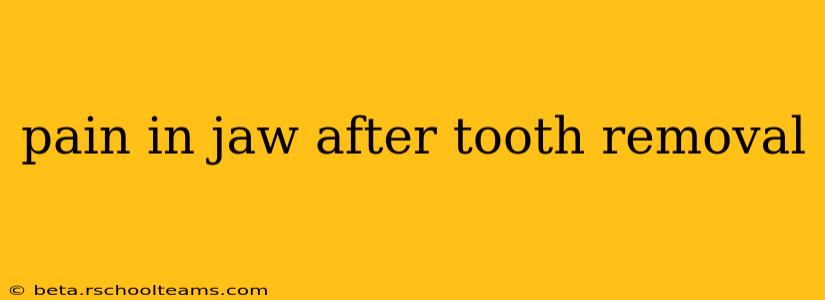Experiencing jaw pain after a tooth extraction is a common occurrence, often leaving patients wondering what's normal and when to seek professional help. This comprehensive guide will delve into the various reasons behind post-extraction jaw pain, effective treatment options, and preventative measures you can take. Understanding these aspects can significantly improve your recovery and alleviate discomfort.
What Causes Jaw Pain After Tooth Removal?
Jaw pain following a tooth extraction stems from several factors, and its intensity varies depending on the complexity of the procedure and individual healing responses. The most common causes include:
-
Inflammation and Swelling: The extraction site naturally undergoes inflammation as part of the healing process. This inflammation can spread to the surrounding jawbone and tissues, causing pain and discomfort. Swelling is a natural consequence of this inflammatory response.
-
Dry Socket: A dreaded complication, dry socket (alveolar osteitis) occurs when the blood clot protecting the extraction site dislodges or dissolves prematurely. This exposes the underlying bone and nerve endings, leading to severe, throbbing jaw pain.
-
Referred Pain: Pain originating from the extraction site can sometimes radiate to other areas, including the jaw, ear, and temple. This referred pain is a common phenomenon, particularly with wisdom tooth extractions due to their proximity to nerves.
-
Sinus Issues: Extractions of upper molars can sometimes puncture the maxillary sinus, leading to sinus pain that can manifest as jaw pain. This complication is less frequent but requires immediate attention.
-
Infection: Although less common with proper post-operative care, infection at the extraction site can cause significant jaw pain, accompanied by other symptoms like fever and swelling.
How Long Does Jaw Pain After Tooth Extraction Last?
The duration of jaw pain post-extraction varies greatly. Mild discomfort usually subsides within a few days, while more significant pain might persist for a week or two. However, persistent or worsening pain beyond two weeks warrants a visit to your dentist. The healing process is individual-specific, influenced by factors like the type of extraction, overall health, and adherence to post-operative instructions.
What to Do About Jaw Pain After Tooth Extraction?
Managing jaw pain effectively involves a multi-pronged approach:
-
Medication: Your dentist will likely prescribe pain relievers, such as ibuprofen or stronger narcotics if necessary. Follow the prescribed dosage and duration carefully.
-
Ice Packs: Applying ice packs to the affected area for 15-20 minutes at a time, several times a day, can help reduce swelling and pain.
-
Rest: Adequate rest allows your body to focus on healing. Avoid strenuous activities and excessive talking in the initial days following the extraction.
-
Gentle Rinsing: Gently rinsing your mouth with salt water can help keep the extraction site clean and reduce infection risk. Avoid vigorous rinsing or spitting.
Is Jaw Pain After Tooth Extraction Normal?
Some level of jaw pain is expected after a tooth extraction, especially in the first few days. However, the intensity and duration of the pain can vary considerably. Mild to moderate pain that gradually improves over time is generally considered normal. Severe, persistent, or worsening pain might indicate a complication and requires immediate dental attention.
When Should You Call Your Dentist About Jaw Pain After a Tooth Extraction?
Contact your dentist immediately if you experience:
-
Severe or worsening pain: Pain that doesn't respond to prescribed medication or intensifies over time is a cause for concern.
-
Excessive bleeding: Continuous bleeding or bleeding that soaks through multiple gauze pads requires immediate attention.
-
Signs of infection: Fever, increased swelling, redness, or pus around the extraction site indicate a potential infection.
-
Difficulty opening your mouth: Significant jaw stiffness or inability to open your mouth fully warrants prompt evaluation.
-
Numbness that persists: Lingering numbness beyond a few days could indicate nerve damage.
How to Prevent Jaw Pain After Tooth Extraction?
While some degree of discomfort is unavoidable, you can minimize the risk of significant jaw pain by following your dentist's instructions carefully. This includes:
-
Following post-operative instructions precisely: Adhering to medication regimens, dietary restrictions, and oral hygiene practices is crucial.
-
Avoiding strenuous activities: Resting and avoiding strenuous activities promotes faster healing and reduces the risk of complications.
-
Maintaining good oral hygiene: Gentle brushing and flossing around the extraction site (once the healing allows) prevents infections.
-
Eating soft foods: Opt for soft, easily chewable foods to minimize stress on the extraction site.
This guide provides comprehensive information on jaw pain after tooth removal. However, it's crucial to consult with your dentist or oral surgeon for personalized advice and treatment based on your specific situation. They can diagnose the underlying cause of your pain and recommend the most appropriate course of action. Remember, early intervention is key to a comfortable and uneventful recovery.
